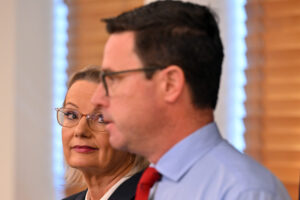An unprecedented year: reflecting on 2020 with Richard Denniss
Let’s face it, 2020 has been a bit of a nightmare. This week, in our final episode of the year, Ebony Bennett and Richard Denniss revisit some of the Australia Institute’s predictions back in March 2020 and reflect on the way Australia’s economy and politics have changed this year in response to the pandemic. Mild language warning.
Host: Ebony Bennett, deputy director of the Australia Institute // @ebony_bennett
Guest:
Richard Denniss, chief economist, The Australia Institute // @RDNS_TAI
Producer: Jennifer Macey
Theme music is by Jonathan McFeat from Pulse and Thrum
Between the Lines Newsletter
The biggest stories and the best analysis from the team at the Australia Institute, delivered to your inbox every fortnight.
You might also like
The election exposed weaknesses in Australian democracy – but the next parliament can fix them
Australia has some very strong democratic institutions – like an independent electoral commission, Saturday voting, full preferential voting and compulsory voting. These ensure that elections are free from corruption; that electorate boundaries are not based on partisan bias; and that most Australians turn out to vote. They are evidence of Australia’s proud history as an
Gender parity closer after federal election but “sufficiently assertive” Liberal women are still outnumbered two to one
Now that the dust has settled on the 2025 federal election, what does it mean for the representation of women in Australian parliaments? In short, there has been a significant improvement at the national level. When we last wrote on this topic, the Australian Senate was majority female but only 40% of House of Representatives
Ensuring workers’ safety in the climate crisis
As I watched the fires in Los Angeles unfold in January this year, my mind of course reflected on the 1999-2000 Black Summer bushfires in Australia. Both these seasons have wrought significant damage to humans and other animals, and to land, infrastructure and property. There has been a huge personal, collective and financial toll involved.




